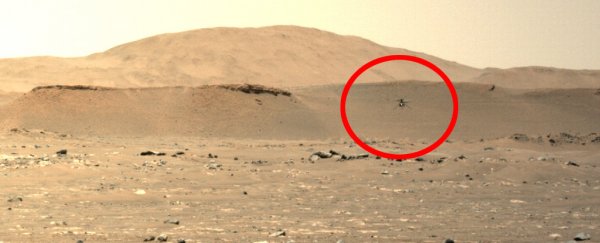NASA's Ingenuity helicopter successfully executed its third flight over the surface of Mars on Sunday.
The helicopter made spaceflight history last Monday when it lifted off Mars and rose 3.05 meters above the planet's surface. Never before had a spacecraft conducted a controlled, powered flight on another planet.
Then on Thursday, Ingenuity flew even higher – 5 meters (16 feet) – and moved sideways for the first time.
Sunday's flight was Ingenuity's most daring excursion to date.
The helicopter took off at 1:31 am ET, or 12:33 pm local Mars time, NASA said.
Ingenuity rose to the same altitude as list time, reaching a maximum airspeed of 2 meters (6.5 feet) per second – about 8 kilometers (5 miles) per hour. (The last flight only reached an airspeed of 0.5 meters per second.)
Then the helicopter traveled 50 meters (164 feet) north – almost half the length of a football field, its farthest distance yet.
"Today's flight was what we planned for, and yet it was nothing short of amazing," David Lavery, the project's program executive, said in a press release.
"With this flight, we are demonstrating critical capabilities that will enable the addition of an aerial dimension to future Mars missions."
The entire flight lasted roughly 80 seconds.
"Flight three is a big step, one in which Ingenuity will begin to experience freedom in the sky," Håvard Grip, Ingenuity's chief pilot, wrote Friday before the excursion.
Ingenuity's team plans to push the helicopter to its limits – even if it crashes
Ingenuity has proven that aerial exploration is possible on other planets, but its mission is far from over. Now NASA wants to gain as much flight data as possible to inform future space-helicopter efforts.
In up to two more flights over the next two weeks, Ingenuity's controllers plan to push the helicopter as far and fast as it will go. In the process, they expect Ingenuity will crash.
"We really want to push the rotorcraft flights to the limit and really learn and get information back from that," MiMi Aung, the project manager for Ingenuity, said in a recent press briefing.
The fifth and final venture could take Ingenuity laterally across 300 meters (980 feet) of Martian ground, according to NASA's website. Aung, however, said she would "love" to push it over 600 meters (2,000 feet).
By the fifth flight, the helicopter "would be unlikely to land safely, because we'll start going into un-surveyed areas," Aung said in a preflight briefing on April 9.
Speeding up will also challenge the chopper's mechanics and its navigation system.
"If we do have a bad landing, that will be the end of mission," Aung said. "The lifetime will be determined by how well it lands, pretty much."
A looming deadline for the last two flights
Ingenuity's flights offer just a peek at the potential of future space helicopters, which could explore parts of Mars and other planets that are inaccessible to rovers. Caves, canyons, mountains, and rocky terrains could all be the domain of a new generation of space-drone explorers.
But the 2 kilogram (4.5 pound) helicopter – roughly the size of a tissue box – is coming up on a looming deadline.
Preparations and a delay caused by a software issue consumed the first two weeks of NASA's 30-day window to conduct up to five flights.
Less than two weeks remain before Perseverance – the rover that carried Ingenuity to Mars – has to continue on its main alien-fossil-hunting mission.
Aung said Monday that there should be enough time to squeeze in all five flights as planned.
This article was originally published by Business Insider.
More from Business Insider:
